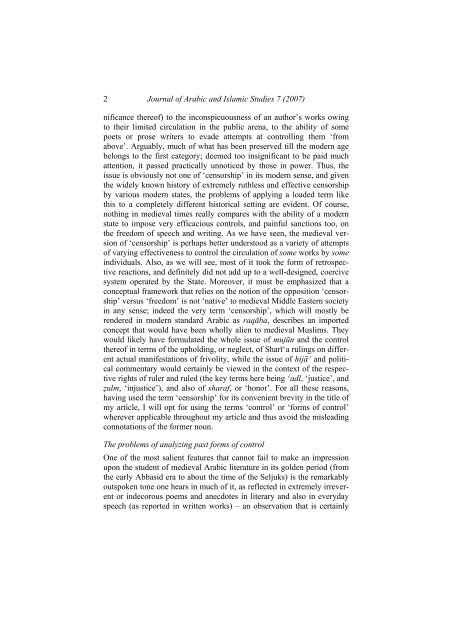Freedom of Expression and Censorship in Medieval Arabic Literature
Freedom of Expression and Censorship in Medieval Arabic Literature
Freedom of Expression and Censorship in Medieval Arabic Literature
You also want an ePaper? Increase the reach of your titles
YUMPU automatically turns print PDFs into web optimized ePapers that Google loves.
2<br />
Journal <strong>of</strong> <strong>Arabic</strong> <strong>and</strong> Islamic Studies 7 (2007)<br />
nificance there<strong>of</strong>) to the <strong>in</strong>conspicuousness <strong>of</strong> an author’s works ow<strong>in</strong>g<br />
to their limited circulation <strong>in</strong> the public arena, to the ability <strong>of</strong> some<br />
poets or prose writers to evade attempts at controll<strong>in</strong>g them ‘from<br />
above’. Arguably, much <strong>of</strong> what has been preserved till the modern age<br />
belongs to the first category; deemed too <strong>in</strong>significant to be paid much<br />
attention, it passed practically unnoticed by those <strong>in</strong> power. Thus, the<br />
issue is obviously not one <strong>of</strong> ‘censorship’ <strong>in</strong> its modern sense, <strong>and</strong> given<br />
the widely known history <strong>of</strong> extremely ruthless <strong>and</strong> effective censorship<br />
by various modern states, the problems <strong>of</strong> apply<strong>in</strong>g a loaded term like<br />
this to a completely different historical sett<strong>in</strong>g are evident. Of course,<br />
noth<strong>in</strong>g <strong>in</strong> medieval times really compares with the ability <strong>of</strong> a modern<br />
state to impose very efficacious controls, <strong>and</strong> pa<strong>in</strong>ful sanctions too, on<br />
the freedom <strong>of</strong> speech <strong>and</strong> writ<strong>in</strong>g. As we have seen, the medieval version<br />
<strong>of</strong> ‘censorship’ is perhaps better understood as a variety <strong>of</strong> attempts<br />
<strong>of</strong> vary<strong>in</strong>g effectiveness to control the circulation <strong>of</strong> some works by some<br />
<strong>in</strong>dividuals. Also, as we will see, most <strong>of</strong> it took the form <strong>of</strong> retrospective<br />
reactions, <strong>and</strong> def<strong>in</strong>itely did not add up to a well-designed, coercive<br />
system operated by the State. Moreover, it must be emphasized that a<br />
conceptual framework that relies on the notion <strong>of</strong> the opposition ‘censorship’<br />
versus ‘freedom’ is not ‘native’ to medieval Middle Eastern society<br />
<strong>in</strong> any sense; <strong>in</strong>deed the very term ‘censorship’, which will mostly be<br />
rendered <strong>in</strong> modern st<strong>and</strong>ard <strong>Arabic</strong> as raqāba, describes an imported<br />
concept that would have been wholly alien to medieval Muslims. They<br />
would likely have formulated the whole issue <strong>of</strong> mujūn <strong>and</strong> the control<br />
there<strong>of</strong> <strong>in</strong> terms <strong>of</strong> the uphold<strong>in</strong>g, or neglect, <strong>of</strong> Sharīʿa rul<strong>in</strong>gs on different<br />
actual manifestations <strong>of</strong> frivolity, while the issue <strong>of</strong> hijāʾ <strong>and</strong> political<br />
commentary would certa<strong>in</strong>ly be viewed <strong>in</strong> the context <strong>of</strong> the respective<br />
rights <strong>of</strong> ruler <strong>and</strong> ruled (the key terms here be<strong>in</strong>g ʿadl, ‘justice’, <strong>and</strong><br />
ẓulm, ‘<strong>in</strong>justice’), <strong>and</strong> also <strong>of</strong> sharaf, or ‘honor’. For all these reasons,<br />
hav<strong>in</strong>g used the term ‘censorship’ for its convenient brevity <strong>in</strong> the title <strong>of</strong><br />
my article, I will opt for us<strong>in</strong>g the terms ‘control’ or ‘forms <strong>of</strong> control’<br />
wherever applicable throughout my article <strong>and</strong> thus avoid the mislead<strong>in</strong>g<br />
connotations <strong>of</strong> the former noun.<br />
The problems <strong>of</strong> analyz<strong>in</strong>g past forms <strong>of</strong> control<br />
One <strong>of</strong> the most salient features that cannot fail to make an impression<br />
upon the student <strong>of</strong> medieval <strong>Arabic</strong> literature <strong>in</strong> its golden period (from<br />
the early Abbasid era to about the time <strong>of</strong> the Seljuks) is the remarkably<br />
outspoken tone one hears <strong>in</strong> much <strong>of</strong> it, as reflected <strong>in</strong> extremely irreverent<br />
or <strong>in</strong>decorous poems <strong>and</strong> anecdotes <strong>in</strong> literary <strong>and</strong> also <strong>in</strong> everyday<br />
speech (as reported <strong>in</strong> written works) – an observation that is certa<strong>in</strong>ly

















